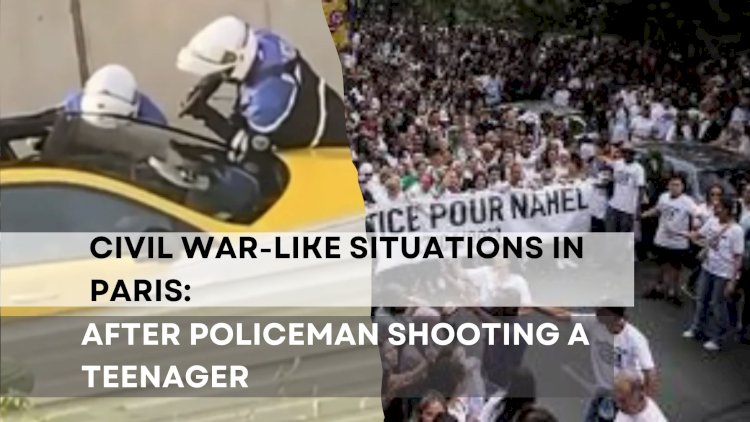Civil War-like Situations in Paris After Policeman Shooting a Teenager
By Shreya Rajvanshi Gangal

Nanterre, a Parisian suburb, has become a hotbed of unrest following the tragic police shooting of Nahel M., a 17-year-old boy. The incident has ignited protest and fury, shining a spotlight on France's intricate and long-standing issues. This event evoked painful memories of the 2005 riots where the death of two teenagers electrocuted in a power substation while fleeing from police swept through the city's suburbs, lasting over three weeks and pushing the country into a state of emergency. Many underlying problems from the 2005 riots remain unresolved, compounded by worsening relations between the police and the public.
For years, evidence has consistently shown that individuals residing in these impoverished suburbs face discrimination solely based on their place of residence when even seeking employment. Even having certain names on their CVs can automatically exclude them due to rampant racial bias. Consequently, discontent among young people has been festering for decades, with the first riot resembling the ongoing Paris protests erupting in Lyon in 1979 when Youths of North African origin rioted.
What is perplexing is the near-absence of meaningful discussions by French leaders on how to tackle the deep-seated issues that fuel the widespread anger in these suburbs, except when crises erupt. President Emmanuel Macron positions himself as a champion of reindustrializing France and revitalizing the economy, yet his vision sorely lacks a comprehensive plan for utilizing economic growth to uplift the suburbs or harness their potential to drive national progress. Despite serving two presidential terms, Macron has failed to produce a coherent policy to address the pressing problems that plague these suburban areas.
The issue of police brutality also looms large in France, extending beyond the tragic incident in Nanterre. Earlier this year, the Council of Europe took the extraordinary step of openly condemning the French police for their "excessive use of force" during protests against Macron's pension reforms. Policing in the country seems trapped in a perpetual cycle of employing either heavy-handed tactics or exercising minimal action. In Marseille's suburbs, the gradual withdrawal of community-based police officers is a key factor fueling tensions between the population and law enforcement. When protests erupt, tear gas and batons are often the response.
Successive governments have relied on the police force to control the population and maintain political stability, inadvertently eroding the legitimacy of law enforcement in the process. However, the police staunchly resist any attempts at reform, aided by powerful unions, while Macron, dependent on the police to quell opposition to his reforms, maintains a supportive stance.
In contrast to his predecessor Nicolas Sarkozy, who further stoked tensions during the 2005 riots by derogatory remarks about the participants, Macron has adopted a more conciliatory approach to Nahel's tragic death. He has unequivocally condemned the killing as "inexcusable" and convened crisis meetings to seek resolution. Macron has genuinely endeavoured to pacify tensions rather than exacerbate them.
However, Macron faces a significant hurdle—the diffuse and decentralized nature of the protestors. There is no centralized leadership to engage in negotiations, and specific demands to de-escalate, thus the situation remains elusive. Similar to the 2005 riots, the current unrest is erupting spontaneously, often on a neighbourhood-by-neighbourhood basis. This poses a formidable challenge for the government to effectively curb escalation and underscores the urgent need for a more comprehensive and thoughtful response to address the deep-rooted problems of limited social prospects and police brutality in the French suburbs.
In conclusion, the unrest in Nanterre highlights the deep-rooted issues faced by marginalized suburbs in France. The tragic police shooting of Nahel M. has drawn attention to challenges such as hyper-marginalization, discrimination, and limited opportunities. However, meaningful discussions and comprehensive strategies to address these grievances have been lacking. The problem of police brutality further fuels tensions, with a cycle of heavy-handed tactics and minimal action undermining trust between law enforcement and communities. President Macron's attempts to calm tensions face obstacles due to the decentralized nature of the protests. Urgent action is needed to address these problems, focusing on upliftment, reform, and a genuine commitment to change. Only through comprehensive efforts can a path towards a more inclusive and equitable society be forged in the French suburbs.
What's Your Reaction?



















